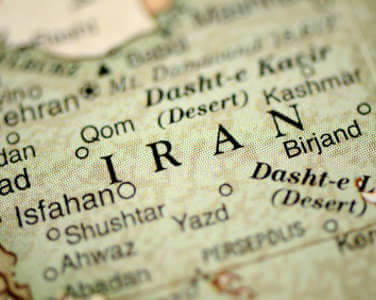Speeches by Iranian religious and political figures between August and October who acknowledged the existence of home fellowships and condemned them as a threat to the state triggered Iran’s crackdown on Christians in the past few months, analysts said.
Iranian authorities have detained more than 70 Christians in a wave of arrests that began around Christmas, according to a report last week by Elam Ministries. With the release of seven Christians last week after they spent a month in solitary confinement, at least 26 Christians remain incarcerated. Sources said that with the arrests across the country continuing, the number of Christians detained since Christmas could be as high as 120.
Though authorities have released most of the Christians after interrogations, many of them are still in prison, especially house group leaders. Many released in the last month had to sign statements saying they would not attend church again.
Iranian leaders have described house churches as the work of the “enemy,” analysts said. On Oct. 19, in Qom, Iran’s religious center, Supreme Leader Ayatollah Ali Khamenei said that Iran’s enemies want to shake the country’s religious and societal values through the spread of Baha’ism and a network of Christian house churches. Khamenei’s speech marked the fifth public statement from an Iranian leader condemning Iranian Christians in the three-month period.
“The public statements show that the government acknowledges the presence of the church and considers it a threat,” a regional analyst who requested anonymity told Compass. “It’s striking they have been talking about it publicly in a way they haven’t previously.”
Sources told Compass that Iranian Christians belonging to house churches knew it was a matter of time before the security forces acted on the supreme leader’s condemnation and tightened their grip on house church members.
“When the supreme leader comes out with a clear statement accusatory towards the church, he sends a clear message to security forces and commanders,” the analyst said. “It’s plausible that this starts a larger crackdown.”
The analyst noted that those who tend to remain detained are the leaders of the groups. While in prison, many Christians undergo harsh treatment that may include solitary confinement, prolonged interrogation, threats and verbal insults, pressure to recant and beatings, according to the Elam report.
While persecution against Christians has intensified, it is believed to be part of a wider government campaign to crack down on any group the government considers threatening. The International Campaign for Human Rights in Iran reported on Jan. 16 that since the beginning of the year, the government had executed 47 people in a two-week period. Thousands have been sentenced to death since elections in 2009.
“Yes, the pressure against Christians has increased, but the human rights violations against all opposition groups are intensifying,” the analyst said. “We have to acknowledge the context.”

The Iranian government is suspicious of Christian activities, which officials see as aiming to convert Muslims and acting as “possible footholds for foreign influence,” reported The Associated Press last month.
Yousef Nadarkhani, a pastor from Rasht, was handed the death sentence for apostasy (leaving Islam) on Nov. 13, 2010. His lawyer has filed an appeal with the Supreme Court, and Nadarkhani is awaiting a trial date. Arrested in October 2009 and serving time in Lakan prison, Nadarkhani is married and has two young children.
None of the other Christians arrested since Christmas has been officially charged, but the analyst said it was clear that with the exception of Nadarkhani’s case, the other arrests were imbued with a “political” tint.
On Jan. 4, the governor of Tehran, Morteza Tamadon, announced the arrest of Christians and called the evangelical movement in Iran “deviant,” according to Elam. On the same day, the president of the Security Council for the province of Tehran said more arrests would follow. Both leaders blamed unidentified organizations in Britain for spreading Christianity.
Mohabat News, a Christian news agency focusing on Iran, reported that official government news and propaganda sites have accused Iranian Christians of collaborating with “illegal” foreign Christian organizations.
“This accusation seems strange when the government judicial authorities are yet to release the name of any such foreign organization and present credible evidence to prove such accusations,” the agency stated.
The news agency described the recent wave of arrests as an attempt to destroy the house group movement in Iran. Recent reports by pro-government media in Iran claimed there were more than 200 house churches in Mashad, northeast of Tehran, the birthplace of Supreme Leader Khamenei, according to Mohabat News.
“These media sources, loyal to the government, accuse these home churches in the city of Mashad of being instruments of foreign powers in weakening the beliefs of Iranian youth,” Mohabat reported.
Last week the agency reported that a new Christian in Keykavar, southwest of Tehran, was arrested on Jan. 11. Authorities questioned Ebrahim Firouzi, 26, on Jan. 8 and 9, both times releasing him. Local court authorities have demanded a bail of US$40,000. His whereabouts and condition are unknown, according to Mohabat.
On Jan. 16, Mohabat also reported that a couple arrested on Dec. 27, 2010 was still in prison. Hassan and Parya Razavi Derakhshan, in their early 60s, were arrested in Mashad because they hosted Christian meetings in their home, according to the Iranian news agency.
The Christians released last week included four women who were confined at Tehran’s Evin Prison; Sara Akhavan, Ladan Nouri, Nasrin Hosseini-nia and one identified only as Anahita were freed on bail on Saturday (Jan. 29) and can still be prosecuted, according to Elam. In Isfahan, three others were released on bail last week – Rafi Nadipoor, Basir Amini and Yasaman Yar-Ahmadi.
























